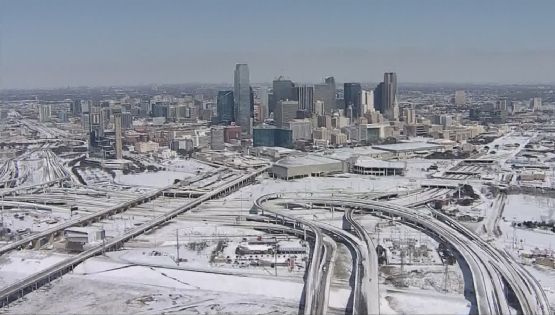I can imagine there are quite a few Texans who wished they could have been on vacation in Cancún right about mid-February this year. Around that time of year weather in Cancún is 80°F. Texas was a bit colder, as in below freezing. But it reached balmy highs of 42°F in those days in Texas. So, why talk about the weather when there is so much else going on in the US and the world? The South of the US was in the midst of enduring the effects of a strong winter storm, soon followed by another. But it is a story that is much more than tales of a winter wonderland. This one involves politics, economics, sterling personalities and hypocrisy. People in Texas will remember the name ‘Uri’ come the next election. You can take that one to the bank. They will also remember the name of one ‘Lyin’ Ted’. And no, Uri is not a Russian name and nor did they hack the US weather or the Texas power grid, just FYI.
From February 13–17, the 2021 North American winter storm, also unofficially referred to as Winter Storm Uri, swept across the Pacific Northwest and quickly down into the southern states on the US, riding on a jet stream dipping down from the artic, even producing snow in northern Mexico (not close to Cancún, though). It was followed by another winter storm, strong enough to be named, as in Viola, which dumped snow across the eastern US, along the I-95 corridor, with the heaviest falls from Massachusetts down into northern Virginia. However, Uri has done major damage and brought havoc to Texas, and that will be the focus of this post. The storm in Texas was detailed as follows:
On February 14–15, the storm dropped prolific amounts of snow across Texas and Oklahoma. As a result of the winter storm and a concurrent cold wave, power grids—unable to sustain the higher-than-normal energy and heating demand from residential and business customers—failed across Texas; at the peak of the outages, at least 4.3 million Texas residents were left without electricity. Two of the electricity reliability commissions servicing the Southern U.S., the Southwest Power Pool (SPP) and the Electric Reliability Council of Texas (ERCOT), ordered rolling blackouts for 14 states amid the frigid temperatures, in an attempt to manage the strain on the power grid and prevent widespread, long-duration blackouts. The controlled outages were initiated after the Southwest Power Pool declared Level 3 Emergency Energy Alerts on both February 15 and 16; the SPP and ERCOT faced criticism by government officials and residents in the region for the limited advanced notice of the outages, and for not outlining the specific areas serviced by SPP partner utilities that would be affected.
The last sentence in the quote outlines why some people face huge power bills, discussed here later. With this background in mind, we begin with the chart for Texas and then look at particulars. The chart is below (bigger):

Texas became a state on 29 Dec 1845, as mandated by Congressional vote and signing by Tyler on 1 Mar 1845. Texas had been officially annexed shortly after Polk took office in March of that year. Since there is no time for signing of the document for statehood by Polk, we use the noon chart in Austin as the time. Austin was the capitol of Texas by then. As it turns out, that time gives quite a good working chart.
The items that immediately stand out about the statehood chart are the Mars/Uranus conjunction in the 12th house just behind the Aries Ascendant, which immediately shows a strong streak of independence, a proclivity to accidents, self-sabotage (12th house), a militant attitude toward any interference in Texan affairs, obstinacy and extraordinary energy that can be immediately brought to bear in stressful circumstances. That conjunction is in turn square the Meridian axis and the Sun/Mercury conjunction. The latter straddles the MC in the statehood chart, with the Sun partile the MC in the 10th house and Mercury in the 9th.
The Sun/Mer/MC combination shows the focus Texans tend to have regarding their status, in that there, too, they have a drive for independence, the ‘thinking person’s government’, and the tendency to want to develop their own individuality. With Capricorn on the MC it shows the drive to achieve superior status and great ambition. And given the square by Mars and Uranus, those ideas are pushed sometimes to extremes. All the preceding is reflected in Texas’ flag and motto: the Lone Star State, which “…reflects the pride and go-it-alone spirit that is still part of the Texas way of life.”
In addition, though, Texas attained statehood on the new moon. This occurred in Capricorn, giving a very strong Capricornian influence over matters of state – conservative, ambitious, large-minded, solid, as well as a tendency to crystallization and breaking due to persistence in old habits and unwillingness to change. The Sun/Moon conjunction also gives rise to a tendency to illness, which we just witnessed regarding its infrastructure and planning.
The preceding planetary combinations also lend themselves to a sense of grandiosity, shown in the natal Mercury/Jupiter trine, with Jupiter also trine the Sun and MC from the 1st house. Mercury is in the 9th house of this working chart, with the Mercury/Jupiter trine giving Texans their tendency to ‘big talk’, even to the point of braggadocio. However, that bragging is often backed by fact, or at least has been in the past.
Texas boasts three of the top ten largest cities in the US, the largest land mass in the ‘lower 48’, an economy larger than the whole of Canada, a lot of oil and gas and a very diverse industrial base. It also has the 2nd-largest population after California. But the focus in this post is on the infrastructure and the electricity grid, both of which are ruled by the 4th house and the Moon by rulership, with the electricity grid in particular being ruled by Uranus.
With the Mars/Uranus conjunction in the 12th house and squaring the IC, we see hidden weaknesses sometimes suddenly manifesting and sometimes disastrous disruptions to infrastructure. That is enhanced by the Vertex being at the midpoint of the Mars/Uranus conjunction, showing the inclination to acts of violence, upsetting events, accidents and physical injury. Texas has seen its share of disasters to its infrastructure, with great loss of life, all shown by directions and transits. The ten biggest were as follows:
- The Galveston hurricane of 1900 (chart)
- The Texas City disaster (chart)
- Hurricane Ike (chart)
- Tropical storm Allison (chart)
- The ’53 Waco tornado outbreak (chart)
- The yellow fever outbreak of 1867 (chart)
- The central Texas flood of 1921 (chart)
- The New London school explosion (chart)
- The 1915 Galveston hurricane (hurricanes seem to favour Galveston) (chart)
- The tornadoes of ’47 in Glazier-Higgins-Woodward (chart)
A quick glance at those charts shows the noon chart for Texas to be a good working chart. We note that Houston is the location for those charts, standing for the whole of Texas. The difference between Houston and Austin regarding the relocated angles is only a few minutes of arc for the Ascendant and one minute of arc for the IC. Since we are not looking at exact events and since this post relates largely to Houston and surrounding areas, this is sufficient to show the efficacy of the statehood working chart. With those charts in mind, we move now to the current disaster, which befell Texas starting on Valentine’s Day this year, otherwise known as Winter Storm Uri. The chart is below (bigger):

For power outages we naturally look to Uranus, ruling electricity and technology as it does. And we are not disappointed as to the working chart. The Sun/Moon midpoint is directed to the Texas IC along with the Mars/Pluto midpoint directed there, and both of those are square the natal Uranus, with transiting Mars activating the directions and Meridian axis by semisquare. That meant lights out in Texas. Uranus is the central feature of the combination of factors and was heavily stressed on the day by the directions and transits. That pretty much tells us what we need to know astrologically about the outages. And those outages persisted for some days, typical of a Mars transit. There are a few more point to add.
The Sun/Moon midpoint, in particular, points to functional disturbances when stressed, with upsets in relations, trouble with vision (in this case, figuratively), the balance of liquids in the body, and troubles in general. Conjunct the IC it pointed to problems with infrastructure and resulting stresses on the public (4th house), and in Cancer, which points to difficulties caused by water. In a mundane chart, such a direction can indicate storms, flooding or drought at the other extreme. The Mars/Pluto midpoint is the ‘surgery midpoint’ and in this case points to the cuts and disruptions in power. Now we get to the main issues aside from the astrology.
The directed Ascendant was opposite the statehood Mars, showing conflicts with officials, further emphasized by directed Neptune opposite the statehood Saturn, the latter ruling the 10th house (the sitting government). Those were bad days for the Texas government. And now, as if to throw the public a bone, the Governor has lifted all the COVID restrictions, despite public health warnings. Texas is #2 in the nation for the total number of COVID cases, behind California. It may soon be #1. Neptune directions to Saturn, or vice-versa, are also known as ‘health directions, and can indicate epidemics in mundane charts – in Ebertin’s words, “The chronic and unhampered progress of malady”. Regardless of what one thinks of the pandemic, the troublous journey of Texas looks set to continue, and not just relative to disease. The Neptune direction plays strongly also on the general image and prestige of Texas and its government, the latter relating to 10th house matters.
Since we are looking at a violent set of factors, activated by a Mars transit, the news was tilting at windmills when the disaster hit. Fingers have been pointed all around instead of looking to the immediate causes, listed next. ‘Don Quixote’ Carlson was at the front of the queue, blaming the power outages on wind power and the Green New Deal. The same was true of Abbott, the Texas governor. The fact is, the Texas power industry got caught with their pants down. This was a prime example of buck-passing, combined with vested energy interests and science denial. There are several reasons why the outages occurred. We might list a few here:
- A lack of upgrades and maintenance to coal and gas power generating plants
- Texas having its own power grid separate from the rest of the nation
- No backup power at critical facilities, like water treatment plants, hospitals and the like
- Lack of foresight when it comes to equipment, as in “What happens if it gets really cold??”
- Big Oil, neoliberalism and politics
The two biggest reasons for the lack of Texan infrastructure at a critical time comes down to cost-cutting to maximize profits (privatized energy infrastructure) and deregulation, which is prompted by special interests lobbying state and federal legislatures to reduce costs and again, maximize profits. These reasons apply not just to power grids, but to infrastructure across the board in the US.
Having worked with industrial machinery in repairs and maintenance for most of my adult life, it is easy to see from my perspective why the power industry in Texas failed to cope. To start, they should have had contingency plans in place to be able to connect to another power grid to boost supply during emergencies. Otherwise, instruments, moving parts and controls were not protected from freezing. Lack of maintenance means checks and corrective measures were left lacking. It is a simple matter to install heaters and insulation at essential points in infrastructure to ensure smooth operation in cold temperatures. But it costs money and cuts into profit margins to do so. I have seen the effects first-hand in industry. Cuts in maintenance and parts kept me in business after the 2008 financial crisis, since I worked in machinery repairs, as in being called out to a lot of repairs due to a lack of maintenance on the part of shop owners. That lasted until companies had to shut their doors or – you guessed it – moved operations overseas due to their business falling off dramatically because of the crisis.
Small government, privatization of primary infrastructure, outsourcing of maintenance and maximization of profits have been the mantra of US politics since the Reagan years in the US, and largely across the West. The main rallying cry among Republicans (Texas is a ‘Red’ state) for the past few decades has been “Deregulation!” From Greg Palast regarding the blackouts:
“What happened was entirely predictable,” power distribution expert attorney Beth Emory said of the blackouts. She told me this twenty years ago, after the first blackouts in Texas and California, following the cruel experiment called “deregulation” of the power industry. Until 1992, the USA had just about the lowest electricity prices in the world and the most reliable system.
For a century, power companies had been limited by law to recovering their provable costs plus a “reasonable,” i.e. small, profit. But in 1992, George H. W. Bush, in the last gasps of his failed presidency, began to deregulate the industry.
“Deregulate” is a misnomer. “De-criminalize” describes it best. With the “free market” supposedly setting the price of power, Texas-based Enron was freed to use such techniques as “Ricochet,” “Get Shorty,” and “Death Star” to blow prices through the roof when weather shut down power plants. (This week was not the first game of Texas Gouge’m.)
It was bad enough the power went out, adding insult to injury that it was allegedly ‘green energy’ that was the culprit, but then people began to get outrageous power bills. When the storms hit, power prices increased by a factor of over 10,000%. That’s not 100% with a misplaced decimal. That is ten thousand times their normal price. How can that be?
It appears that the energy supplier, a firm called Griddy, based in California, was in the business of retailing power to Texas customers and sending those customers those outrageous bills during the high demand period. It should be emphasized that Griddy was in business in Texas, but has since gotten the big Texas boot when ERCOT pulled the plug on them. Griddy is now being sued by the Texas AG for sending those bills to customers during the blackouts. Consider the following regarding electrical retailing in the United States:
Over the past several decades, many US states have moved to deregulate their electric markets, with 24 states allowing for at least some competition among retail electric providers (REPs) including California, Texas, and New York. These companies include Ambit Energy, TXU, Just Energy, Con Edison, Champion Energy, Constellation, and Reliant Energy among many others. Deregulation of electric retailers has been subject to much controversy as more states have opted for competitive markets.
‘Over the past several decades’ coincides with the inception of Clinton and Blair’s 3rd Way economics, which turbocharged the neoliberal market-based economy across the West. ‘Competition’ is not always a good thing when it comes to state infrastructure, as competition also has the hidden meaning of cutting costs, meaning running the infrastructure at a bare-bones minimum. Griddy had told its customers to switch suppliers when the demand for power began to spike during the advent of Uri, but there were some clients who either ignored the advice or failed to take note. Griddy had kindly offered the customers with the large bills a five-month plan to pay those bills off, but not allowing them to switch to other providers until they had done so. Those customers have since been switched to other providers since Griddy got run out of town.
Deregulation and opening the electricity market was supposed to encourage competition between providers to keep customer prices down. The problem with deregulation is that it also encourages practices like those of Griddy and leaves customers to the whims and dictates of supply contracts. Under the regulated system the power companies are allowed to charge enough to cover their costs with a small amount of profit. While living in Australia, though, I saw the opposite effect on power prices as the power industry there began its wave of deregulation. Prices crept up and up. It was the same with water rates. And that brings in another problem for when the power goes out.
Without power, water filtration and pumping stops, remembering preceding statements about the Sun/Moon midpoint, meaning waste water builds up, water stagnates in pipes and people lose supply to their houses. A week after Uri struck, about a third of Texans were still without safe water supply or left with none at all. It has since been restored, but many Texans had to boil water before it was safe to drink. And without power there was also a lack of heat, meaning pipes froze in many homes, leading to ruptured pipes and flooded homes. That also means a very hefty repair bill to fix the broken pipes on top of power bills. Then there is the political aspect of the outages.
When Uri swept through Texas, Texas Senator Ted Cruz decided it was a good time to go to Cancún. Texans were less than impressed. He was videoed going through the airport on his way out with his family. Social media was scathing, and since any politician depends on public opinion for their survival, Cruz found it within his heart to return to Texas on the hop. His reasoning for going to Cancún in the middle of a crisis situation was because of his daughters, thus throwing them under the proverbial bus. On the other hand, Ms. Cruz is a little peeved that her phone texts to her friends detailing plans for their sunny getaway were leaked to the press. Who needs friends, right? Heidi Cruz, we might remember, is a managing director at Goldman Sachs, one of the bastions of neoliberalism. An epic crisis perhaps deserves an epic fail to go along with it.
Speaking of epic fails, there was also a particular now ex-mayor of Colorado City, one Tim Boyd, who had this to say to residents during the crisis, showing his support of rugged individualism and pull-yourself-up-by-the-bootstraps mind-set with this inspirational thought:
“No one owes you [or] your family anything; nor is it the local government’s responsibility to support you during trying times like this!” he said. “Sink or swim it’s your choice! The City and County, along with power providers or any other service owes you NOTHING! I’m sick and tired of people looking for a damn handout.”
There was more to his message, motivating as it was. He is now looking for other gainful employment, maybe in Cancún. His grammar could use a little work, too, as he seeks to update his CV. But in that expanded message was also commentary on American politics, notably regarding socialism. Perhaps Tim Boyd, and many political conservative (or what passes for American conservatism these days) leaders fail to note is that the US has had social programs for decades, which have put people to work, enabled them to find work, which once funded an educational system which was the world’s envy…I know, that was some time ago.
Americans actually like a little bit of socialism, but they would never call it that. The GI Bill, Social Security, Medicare, food stamps, unemployment benefits – social programs most people take for granted – are all aspects of socialism. And Americans in the majority want those expanded, along with free or low-cost education for themselves and their kids. It’s called ‘investment in the future’.
The point is, unless there is investment in public skills and education – what Mr. Boyd might call a ‘handout’ – there is precious little skills base or knowhow to build strong infrastructure and economy. Your average McDonald’s hamburger ‘chef’ or retail person is not going to be able to tell you how to repair plumbing or wire a house. Those sorts of skills come in handy in instances like, well, power outages.
The soapbox aside, this little episode in Texas history has gone a long way toward showing up the deficiencies in the present economic system, the strong divides in politics, hypocrisy in politicians, the changes needed to bring American infrastructure back up to scratch and that maybe, just maybe, Texans may want to look at a neighborly hand when it comes to electrical supply in the future instead of being so single-mindedly independent. There is nothing wrong with trying to be independent. But in times of crisis, it is good to know who your friends are. And helping people in need is also known as ‘service to the community’, Mr. Boyd.
Most people want to work, if they can, but they also want to be able to make a decent wage and not be gouged for services when the going is rough. And if people made a decent wage, maybe there would be that spare emergency generator in the garage the next time the power goes out, instead of risking carbon monoxide poisoning by trying to heat one’s home with the car or the BBQ grill. Hopefully there have been some valuable lessons learned because of Winter Storm Uri, not just for Texas, but for the nation as a whole. The whole of America should take note, speaking as an American. Texas is not the only state facing such challenges. It is a nationwide phenomenon. Note to President Biden: Fix the infrastructure in the US instead of bombing overseas. We have too many challenges at home.
Featured pic from WTSP

